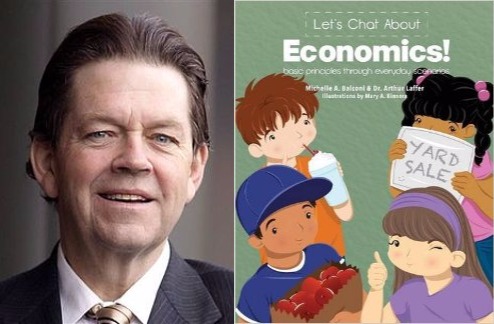How To Raise An Economist

How many times have we told our children, “There’s no such thing as a free lunch,” just as our parents and grandparents passed this along to us? We say this from experience and believe it to be true of our household finances, yet we do not apply the same rule to our government. It should come as no surprise then that 77 percent of millennials polled in a Bankrate survey last year support offering higher education at public universities free of charge.
“Free” is a four-letter word, but that’s not why we shouldn’t say it. As the expression states, there is simply no such thing. Those preferring no cost college should understand this really means taxpayer-funded education, in which case they will pay for their degree and the degrees of others, with higher tax rates. But with only 20 states requiring an economics class in high school, down two states from 2014 according to the Council on Economic Education, it’s not likely the 77 percent have thought this through.
We’ve come to think of “free” as the universal cure. Instead, let’s stop using the word and encourage understanding of how things are paid for, since everything must have a cost. The “free” trolley rides to customers with limited parking? The “free” social media account? The “free” samples of fresh pineapple at the grocery store? The “free” admission to a public park? These uses of “free” are not only misleading, but also false.
Instead of a sign that reads “free trolley rides,” a truthful message would be: “local business-sponsored trolley rides.” Similarly, instead of “free college education,” the message should be: “taxpayer-funded college education.”
It is easy to take “free” at face value when it surrounds us in advertising. We just cannot afford to let this false idea perpetuate into reality. We can prevent the spread of the something-for-nothing mentality by teaching our children and grandchildren to always view “free” with a skeptical eye and look for the real story.
According to most state curricula, the majority of fifth graders are taught the principles of scarcity, wants versus needs and opportunity costs. Families can easily augment these lessons at home with conversations about daily decisions. Spending money or time on one item or activity means forgoing the purchase of another item or forgoing participation in another activity. If your family is paying to be on a travel sports team, can you afford to schedule a summer vacation? If a business owner is sponsoring trolley rides, can they hire additional staff? If our government is using tax money for higher education, can we reduce the national debt?
Whenever your family hears or sees the word “free,” take a minute to discuss how things are paid for, and develop your children’s knowledge of how the world works. Their understanding will last longer and have a greater impact than “because I said so.”
As the next generation is due to inherit a national debt of $20 trillion, an inquisitive mind is the most powerful skillset we can bequeath to our children. It will lay the foundation for lifelong learning and independence. Stop using and accepting the word “free,” and raise your children and grandchildren to think like economists.
Michelle A. Balconi is a writer and speaker focused on connecting children and adults through important topics. Arthur B. Laffer, Ph.D. is founder and chairman of Laffer Associates and was an adviser to President Reagan. Balconi and Laffer collaborated to write “Let’s Chat About Economics,” and “Let’s Chat About Democracy,” illustrated books for young families, introducing real terms in everyday scenarios. More information can be found at www.letschatbooks.com
Tags: Economics











